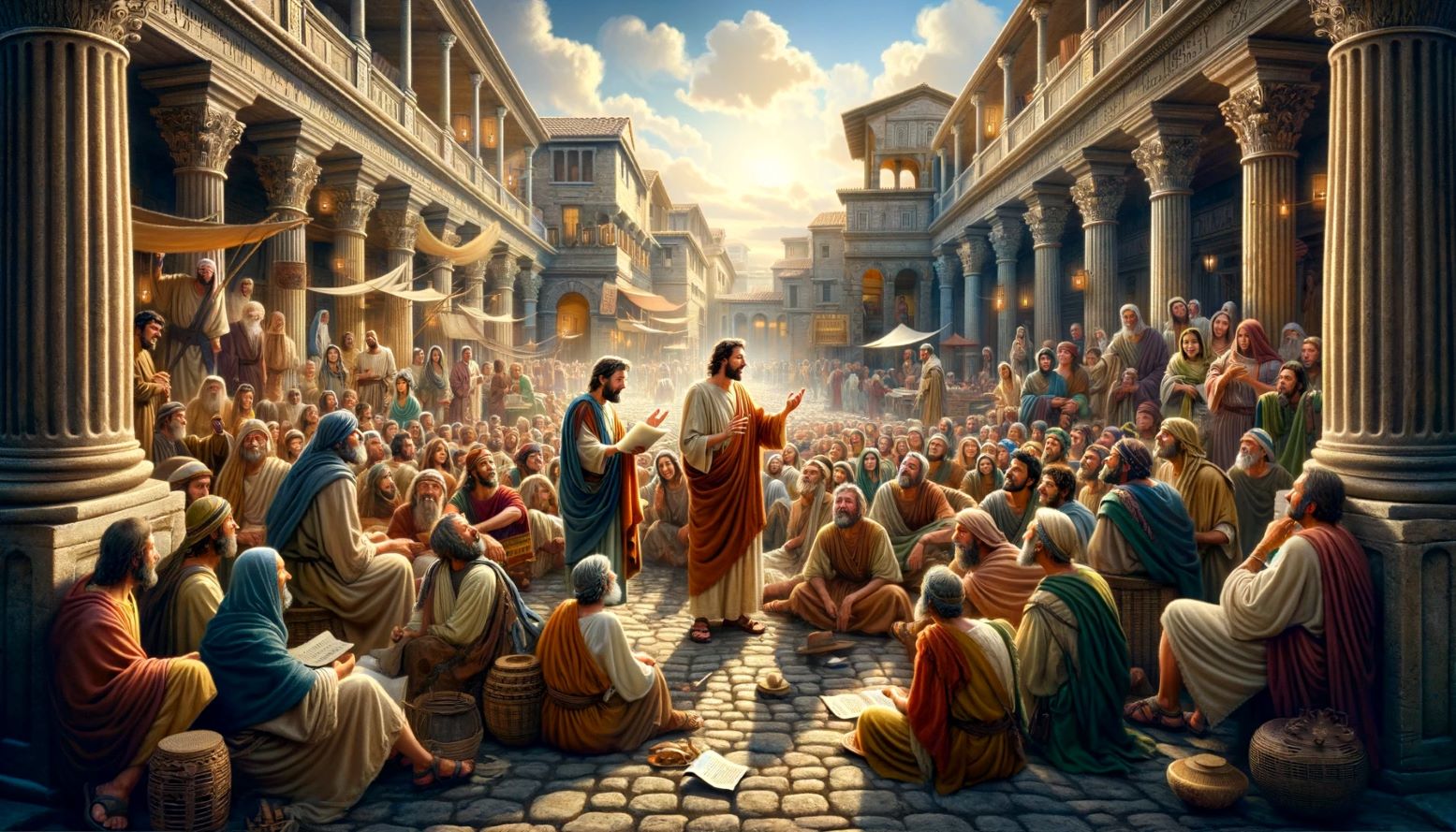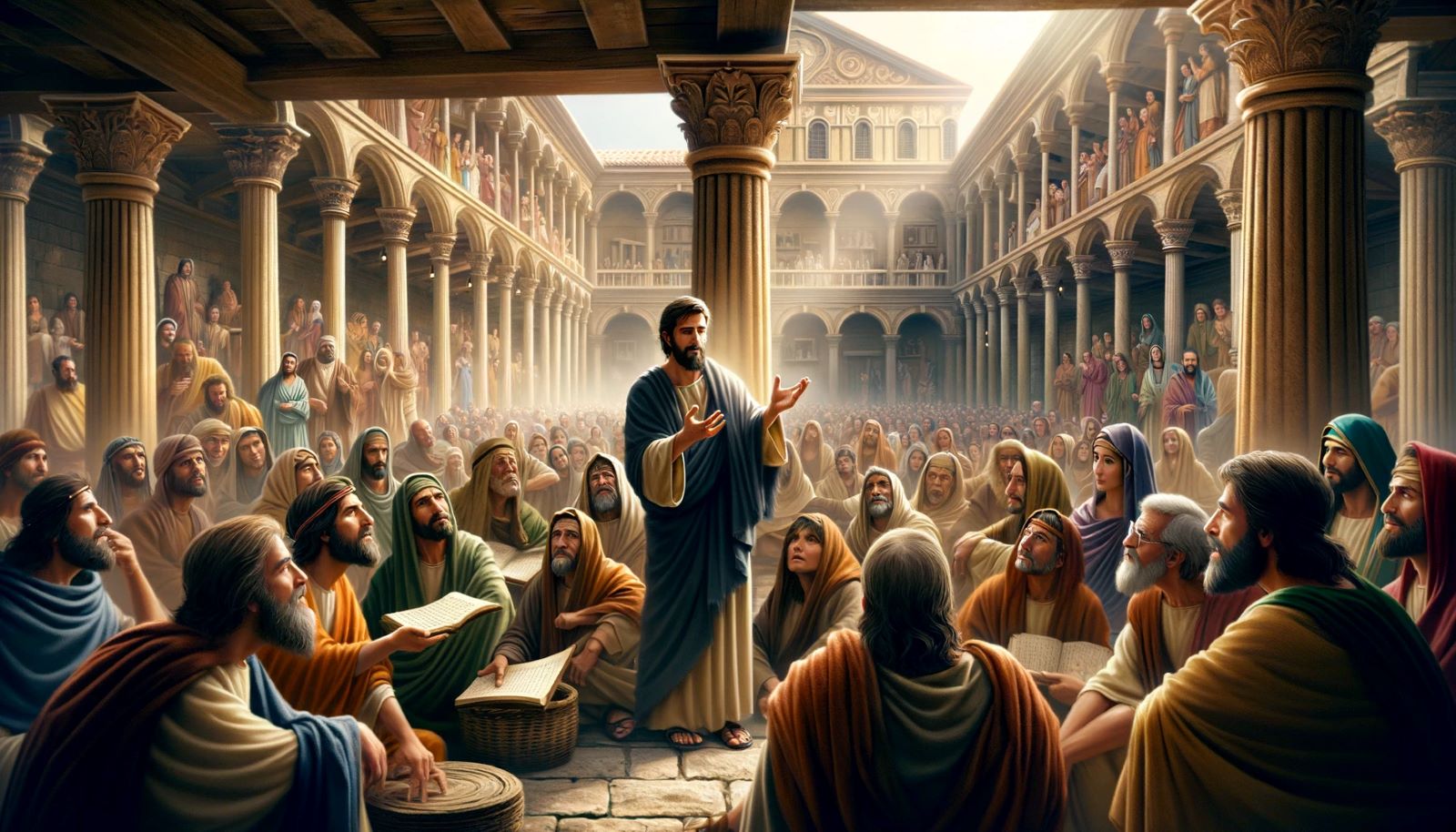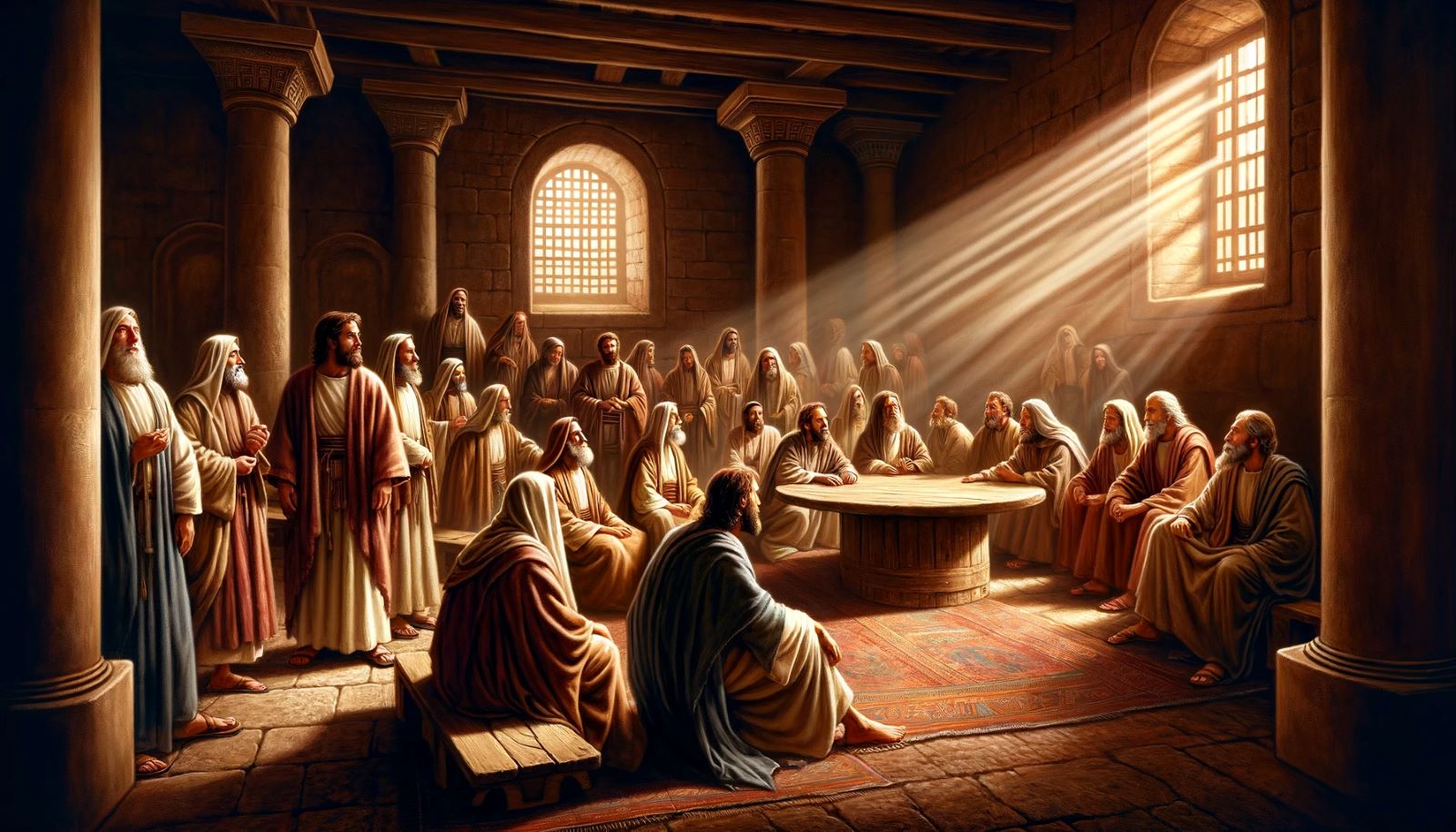Home>Bible Facts>How Were The Twelve Apostles Killed


Bible Facts
How Were The Twelve Apostles Killed
Published: February 22, 2024
Peter Smith, Editorial Director at Christian.net, combines deep insights into faith, politics, and culture to lead content creation that resonates widely. Awarded for his contributions to religious discourse, he previously headed a major organization for religious communicators, enhancing dialogue on faith's societal impacts.
Discover how the Twelve Apostles were martyred and learn fascinating Bible facts. Explore the historical accounts of their deaths and their enduring legacy.
(Many of the links in this article redirect to a specific reviewed product. Your purchase of these products through affiliate links helps to generate commission for Christian.net, at no extra cost. Learn more)
Table of Contents
Introduction
The Twelve Apostles, also known as the Twelve Disciples, were a group of ordinary men who played an extraordinary role in the spread of Christianity. These individuals were chosen by Jesus Christ to become his closest companions and to carry out his teachings to the world. Their unwavering dedication and pivotal roles in the early Christian church have made them figures of great significance in the history of Christianity.
The lives of the Twelve Apostles were marked by profound experiences, remarkable faith, and, in many cases, martyrdom. Their stories are woven into the fabric of the New Testament, and their contributions have left an indelible mark on the Christian faith. Understanding the circumstances of their deaths provides insight into the challenges they faced and the sacrifices they made in their commitment to spreading the message of Jesus Christ.
As we delve into the accounts of how each of the Twelve Apostles met their fate, we gain a deeper appreciation for their enduring legacy and the profound impact they had on the early Christian community. Their unwavering faith, even in the face of persecution and death, serves as a testament to the power of belief and the enduring influence of their teachings.
The stories of the Twelve Apostles serve as a reminder of the sacrifices made to uphold their beliefs and the enduring legacy they left behind. Each apostle's journey and ultimate sacrifice are a testament to the profound impact of their faith and dedication to spreading the message of Jesus Christ. As we explore the accounts of their deaths, we gain a greater understanding of the challenges they faced and the unwavering commitment they demonstrated in the face of adversity.
Read more: How Were The Apostles Killed
Judas Iscariot
Judas Iscariot, one of the Twelve Apostles, is perhaps best known for his infamous act of betrayal. His name has become synonymous with treachery, as his decision to betray Jesus Christ has reverberated through history. Judas was entrusted with the responsibility of being the treasurer among the disciples, yet his actions ultimately led to a tragic end.
The betrayal of Jesus by Judas is a pivotal event in the New Testament, as it set in motion the events that would lead to the crucifixion of Jesus. According to the Gospel of Matthew, Judas agreed to hand over Jesus to the religious authorities in exchange for thirty pieces of silver. This act of betrayal took place in the Garden of Gethsemane, where Judas identified Jesus to the authorities by greeting him with a kiss.
The consequences of Judas' betrayal were profound. Following Jesus' arrest, he was crucified, and Judas, overwhelmed with guilt and remorse, took his own life. The Gospel of Matthew describes how Judas, unable to bear the weight of his actions, returned the thirty pieces of silver to the chief priests and elders before hanging himself.
The story of Judas Iscariot serves as a cautionary tale, illustrating the devastating consequences of betrayal and the enduring impact of one's choices. Despite his role in the betrayal of Jesus, Judas' story is a complex and tragic one, prompting reflection on the nature of forgiveness and the human capacity for remorse.
Judas' fate stands as a somber reminder of the profound consequences of betrayal and the enduring legacy of his actions. His story serves as a poignant reminder of the complexities of human nature and the enduring impact of choices made in moments of weakness and temptation.
The story of Judas Iscariot is a sobering reminder of the complexities of human nature and the enduring impact of choices made in moments of weakness and temptation. His tragic end serves as a cautionary tale, prompting reflection on the consequences of betrayal and the enduring legacy of his actions.
Simon Peter
Simon Peter, also known simply as Peter, holds a significant place among the Twelve Apostles. He was a fisherman by trade when Jesus called him to become a "fisher of men." Peter's unwavering devotion and his pivotal role in the early Christian church have solidified his place as one of the most prominent figures in Christian history.
Peter's journey with Jesus was marked by moments of great faith and, at times, moments of doubt. He was the first among the disciples to openly declare Jesus as the Messiah, earning him the acknowledgment of being the "rock" upon which Jesus would build his church. However, Peter also experienced moments of weakness, such as when he denied Jesus three times before the rooster crowed, fulfilling Jesus' earlier prediction.
After the death and resurrection of Jesus, Peter emerged as a central figure in the early Christian community. He played a crucial role in spreading the teachings of Jesus and was instrumental in the growth of the early church. His boldness and unwavering commitment to his faith made him a powerful and influential leader.
In the later years of his life, Peter faced persecution and hardship for his beliefs. According to tradition, Peter was martyred in Rome during the reign of Emperor Nero. His death is believed to have occurred around the same time as the Great Fire of Rome, and it is said that he was crucified upside down at his own request, feeling unworthy to die in the same manner as Jesus.
Peter's steadfastness in the face of persecution and his willingness to endure a painful death rather than renounce his faith serve as a testament to his unwavering commitment to the teachings of Jesus. His legacy continues to inspire countless individuals, and his contributions to the early Christian church have left an indelible mark on the history of Christianity.
The story of Simon Peter is one of resilience, faith, and unwavering dedication. His journey from a humble fisherman to a central figure in the early Christian church is a testament to the transformative power of belief and the enduring impact of his contributions. Peter's unwavering commitment to his faith, even in the face of persecution and death, serves as a powerful example of the profound influence of the Twelve Apostles in shaping the foundations of Christianity.
Andrew
Andrew, the brother of Simon Peter, was among the first disciples called by Jesus. Described as a fisherman from the town of Bethsaida, Andrew's journey with Jesus was marked by unwavering dedication and a steadfast commitment to spreading the teachings of Christ.
Andrew's encounter with Jesus is depicted in the Gospels, where he and his brother, Simon Peter, were casting their nets into the sea when Jesus called out to them, saying, "Follow me, and I will make you fishers of men." Without hesitation, Andrew and Peter left their nets and followed Jesus, embarking on a transformative journey that would shape the course of their lives.
As one of the Twelve Apostles, Andrew played a significant role in the ministry of Jesus. He witnessed the miracles performed by Jesus, heard his profound teachings, and was entrusted with the responsibility of carrying forth the message of salvation to the world. Andrew's unwavering faith and commitment to Jesus' teachings solidified his place among the closest companions of the Messiah.
Following the death and resurrection of Jesus, Andrew's missionary zeal led him to various regions, where he fearlessly proclaimed the gospel. Tradition holds that Andrew traveled to the region of Scythia, located in modern-day Ukraine and Russia, where he preached the message of Christianity with fervor and conviction. His efforts to spread the teachings of Jesus in distant lands exemplify his dedication to fulfilling the Great Commission.
Andrew's unwavering commitment to his faith ultimately led to his martyrdom. According to tradition, Andrew met his death in the city of Patras, Greece, where he was crucified on an X-shaped cross, now known as the St. Andrew's Cross. Even in the face of persecution and death, Andrew remained resolute in his devotion to Jesus Christ, leaving behind a legacy of courage and unwavering faith.
The life and martyrdom of Andrew serve as a testament to the enduring impact of the Twelve Apostles and their unwavering commitment to spreading the message of Jesus Christ. Andrew's fearless proclamation of the gospel and his willingness to endure persecution and death for his faith stand as a powerful example of the profound influence of the Twelve Apostles in shaping the foundations of Christianity.
The story of Andrew's life and martyrdom continues to inspire believers around the world, serving as a reminder of the sacrifices made by the early disciples in their unwavering commitment to the teachings of Jesus Christ.
James, son of Zebedee
James, the son of Zebedee, was one of the Twelve Apostles chosen by Jesus to accompany him during his ministry. Alongside his brother John, he was part of the inner circle of disciples who shared intimate moments with Jesus, including the Transfiguration and the prayers in the Garden of Gethsemane. James, known for his fervent dedication and unwavering faith, played a significant role in the early Christian church.
As depicted in the Gospels, James and his brother John were fishermen by trade when Jesus called them to become "fishers of men." Their immediate response to Jesus' call exemplifies their readiness to embark on a transformative journey. Throughout their time with Jesus, James witnessed his miracles, heard his teachings, and experienced firsthand the profound impact of his ministry.
James' steadfast commitment to Jesus' teachings and his unwavering faith solidified his place among the closest companions of the Messiah. His dedication to spreading the message of salvation to the world exemplified the profound impact of his role as one of the Twelve Apostles.
Following the death and resurrection of Jesus, James continued to play a pivotal role in the early Christian community. His unwavering commitment to the teachings of Jesus and his fervent proclamation of the gospel contributed to the growth of the early church. James' boldness and dedication to his faith made him a powerful and influential figure in the spread of Christianity.
However, James' unwavering faith and fearless proclamation of the gospel ultimately led to his martyrdom. According to tradition, James was executed by Herod Agrippa I, making him the first of the Twelve Apostles to be martyred. His willingness to endure persecution and death for his faith serves as a testament to his unwavering commitment to the teachings of Jesus Christ.
The life and martyrdom of James, son of Zebedee, stand as a powerful example of the enduring impact of the Twelve Apostles and their unwavering dedication to spreading the message of Jesus Christ. James' legacy continues to inspire believers, serving as a reminder of the sacrifices made by the early disciples in their unwavering commitment to the teachings of Jesus Christ.
John
John, often referred to as the beloved disciple, holds a significant place among the Twelve Apostles. His close relationship with Jesus and his profound contributions to the early Christian church have solidified his legacy as one of the most influential figures in Christian history.
As depicted in the Gospels, John was a fisherman by trade, working alongside his brother James when Jesus called them to become "fishers of men." Their immediate response to Jesus' call exemplified their readiness to embark on a transformative journey. Throughout their time with Jesus, John witnessed his miracles, heard his teachings, and experienced firsthand the profound impact of his ministry.
John's deep bond with Jesus is evident in the Gospel accounts, where he is described as the disciple whom Jesus loved. This intimate connection allowed John to witness pivotal moments in Jesus' life, including the Last Supper and the crucifixion. His presence at the foot of the cross during Jesus' crucifixion further underscores the depth of their relationship.
Following the death and resurrection of Jesus, John emerged as a central figure in the early Christian community. His unwavering commitment to the teachings of Jesus and his fervent proclamation of the gospel contributed to the growth of the early church. John's profound understanding of Jesus' teachings is reflected in his writings, particularly in the Gospel of John, where he expounds on the divinity of Christ and the significance of faith.
In addition to his role as a prominent disciple, John is also known for his authorship of several New Testament books, including the Gospel of John, the three epistles of John, and the Book of Revelation. These writings provide invaluable insights into the early Christian beliefs and serve as a testament to John's enduring influence on the development of Christian theology.
However, John's unwavering faith and fearless proclamation of the gospel ultimately led to his persecution. According to tradition, John faced exile to the island of Patmos, where he authored the Book of Revelation. Despite the hardships he endured, John remained steadfast in his commitment to spreading the message of Jesus Christ.
The life and contributions of John, the beloved disciple, stand as a powerful example of the enduring impact of the Twelve Apostles and their unwavering dedication to spreading the message of Jesus Christ. John's legacy continues to inspire believers, serving as a reminder of the sacrifices made by the early disciples in their unwavering commitment to the teachings of Jesus Christ.
Philip
Philip, one of the Twelve Apostles chosen by Jesus, played a significant role in the early Christian church. His journey with Jesus was marked by unwavering dedication and a steadfast commitment to spreading the teachings of Christ. As depicted in the Gospels, Philip was from the town of Bethsaida and was among the first disciples called by Jesus. His immediate response to Jesus' call exemplified his readiness to embark on a transformative journey.
Throughout his time with Jesus, Philip witnessed the miracles performed by Jesus and heard his profound teachings. His interactions with Jesus, including the miraculous feeding of the multitude and the encounter with the Greek visitors seeking to meet Jesus, provide insights into his character and faith. Philip's unwavering commitment to Jesus' teachings solidified his place among the closest companions of the Messiah.
Following the death and resurrection of Jesus, Philip continued to play a pivotal role in the early Christian community. His unwavering commitment to the teachings of Jesus and his fervent proclamation of the gospel contributed to the growth of the early church. Philip's dedication to spreading the message of salvation exemplified the profound impact of his role as one of the Twelve Apostles.
However, Philip's unwavering faith and fearless proclamation of the gospel ultimately led to his martyrdom. According to tradition, Philip faced persecution and was martyred in the city of Hierapolis in Phrygia. His willingness to endure persecution and death for his faith serves as a testament to his unwavering commitment to the teachings of Jesus Christ.
The life and martyrdom of Philip stand as a powerful example of the enduring impact of the Twelve Apostles and their unwavering dedication to spreading the message of Jesus Christ. Philip's legacy continues to inspire believers, serving as a reminder of the sacrifices made by the early disciples in their unwavering commitment to the teachings of Jesus Christ.
Bartholomew
Bartholomew, also known as Nathanael, was one of the Twelve Apostles chosen by Jesus to accompany him during his ministry. While the Gospels provide relatively little direct information about Bartholomew, his presence among the Twelve Apostles underscores his significance in the early Christian community.
According to the Gospel of John, Bartholomew was initially introduced to Jesus by Philip, who excitedly proclaimed, "We have found the one Moses wrote about in the Law, and about whom the prophets also wrote—Jesus of Nazareth, the son of Joseph." When Nathanael expressed skepticism about the possibility of anything good coming from Nazareth, Philip urged him to come and see for himself. Upon meeting Jesus, Nathanael was greeted with a profound acknowledgment of his character, leading him to declare, "Rabbi, you are the Son of God; you are the king of Israel."
Bartholomew's encounter with Jesus exemplifies the transformative power of faith and the profound impact of personal encounters with the Messiah. His immediate recognition of Jesus' divinity and kingship underscores the depth of his faith and understanding of Jesus' true identity.
Following the death and resurrection of Jesus, Bartholomew continued to play a pivotal role in the early Christian community. His unwavering commitment to the teachings of Jesus and his fervent proclamation of the gospel contributed to the growth of the early church. Bartholomew's dedication to spreading the message of salvation exemplified the profound impact of his role as one of the Twelve Apostles.
However, Bartholomew's unwavering faith and fearless proclamation of the gospel ultimately led to his martyrdom. According to tradition, Bartholomew faced persecution and was martyred for his faith. Accounts vary regarding the circumstances of his death, with some traditions suggesting that he was flayed or skinned alive before being crucified. Despite the brutal nature of his martyrdom, Bartholomew remained resolute in his commitment to spreading the message of Jesus Christ.
The life and martyrdom of Bartholomew stand as a powerful example of the enduring impact of the Twelve Apostles and their unwavering dedication to spreading the message of Jesus Christ. Bartholomew's legacy continues to inspire believers, serving as a reminder of the sacrifices made by the early disciples in their unwavering commitment to the teachings of Jesus Christ.
Matthew
Matthew, also known as Levi, was a tax collector before being called by Jesus to become one of the Twelve Apostles. His transformation from a tax collector to a devoted disciple exemplifies the profound impact of encountering Jesus and the transformative power of faith.
As a tax collector, Matthew was likely viewed with suspicion and disdain by his fellow Jews, as tax collectors were often associated with corruption and collaboration with the Roman authorities. However, when Jesus approached Matthew and simply said, "Follow me," Matthew's immediate response was to leave behind his occupation and follow Jesus without hesitation. This pivotal moment marked the beginning of his transformative journey as a disciple of Christ.
Matthew's Gospel provides invaluable insights into the teachings and ministry of Jesus, emphasizing themes such as the fulfillment of Old Testament prophecies, the kingdom of heaven, and the ethical teachings of Jesus. His meticulous attention to detail and emphasis on Jesus as the fulfillment of Messianic prophecies make his Gospel a foundational text in the New Testament.
Following the death and resurrection of Jesus, Matthew continued to play a pivotal role in the early Christian community. His unwavering commitment to the teachings of Jesus and his fervent proclamation of the gospel contributed to the growth of the early church. Matthew's Gospel, with its emphasis on the universal scope of Jesus' message and the call to discipleship, reflects his dedication to spreading the message of salvation to all.
However, Matthew's unwavering faith and fearless proclamation of the gospel ultimately led to his martyrdom. According to tradition, Matthew faced persecution and was martyred for his faith. Accounts of his martyrdom vary, with some traditions suggesting that he was killed by the sword. Despite the challenges and dangers he encountered, Matthew remained resolute in his commitment to spreading the message of Jesus Christ.
The life and martyrdom of Matthew stand as a powerful example of the enduring impact of the Twelve Apostles and their unwavering dedication to spreading the message of Jesus Christ. Matthew's legacy continues to inspire believers, serving as a reminder of the sacrifices made by the early disciples in their unwavering commitment to the teachings of Jesus Christ.
Read more: How May Apostles Were There
Thomas
Thomas, often referred to as "Doubting Thomas," was one of the Twelve Apostles chosen by Jesus to accompany him during his ministry. His journey with Jesus was marked by moments of doubt, profound faith, and a steadfast commitment to understanding the truth. Thomas' story is encapsulated in a pivotal encounter following Jesus' resurrection, which has left an enduring mark on Christian tradition.
The Gospel of John recounts the iconic episode where Thomas, initially skeptical of the news of Jesus' resurrection, expressed his doubt, stating, "Unless I see the nail marks in his hands and put my finger where the nails were, and put my hand into his side, I will not believe." This moment of doubt has earned Thomas the moniker "Doubting Thomas," yet his subsequent encounter with the risen Jesus serves as a testament to the transformative power of faith.
When Jesus appeared to the disciples, including Thomas, he invited Thomas to touch his wounds, prompting Thomas to declare, "My Lord and my God!" This profound acknowledgment of Jesus' divinity underscores the depth of Thomas' faith and understanding of the truth. Despite his initial doubt, Thomas' encounter with the risen Christ solidified his unwavering belief in the resurrection and the identity of Jesus as the Son of God.
Following the death and resurrection of Jesus, Thomas continued to play a pivotal role in the early Christian community. His unwavering commitment to the teachings of Jesus and his fervent proclamation of the gospel contributed to the growth of the early church. Thomas' journey from doubt to profound faith serves as a powerful example of the transformative impact of encountering the risen Christ.
However, Thomas' unwavering faith and fearless proclamation of the gospel ultimately led to his martyrdom. According to tradition, Thomas faced persecution and was martyred for his faith. Accounts of his martyrdom vary, with some traditions suggesting that he was killed by a spear. Despite the challenges and dangers he encountered, Thomas remained resolute in his commitment to spreading the message of Jesus Christ.
The life and martyrdom of Thomas stand as a powerful example of the enduring impact of the Twelve Apostles and their unwavering dedication to spreading the message of Jesus Christ. Thomas' journey from doubt to unwavering faith continues to inspire believers, serving as a reminder of the sacrifices made by the early disciples in their commitment to the teachings of Jesus Christ.
James, son of Alphaeus
James, son of Alphaeus, was one of the Twelve Apostles chosen by Jesus to accompany him during his ministry. While the New Testament provides relatively limited direct information about James, his presence among the Twelve Apostles underscores his significance in the early Christian community.
As one of the Twelve Apostles, James played a crucial role in the ministry of Jesus. He witnessed the miracles performed by Jesus, heard his profound teachings, and was entrusted with the responsibility of carrying forth the message of salvation to the world. James' unwavering faith and commitment to Jesus' teachings solidified his place among the closest companions of the Messiah.
Following the death and resurrection of Jesus, James continued to play a pivotal role in the early Christian community. His unwavering commitment to the teachings of Jesus and his fervent proclamation of the gospel contributed to the growth of the early church. James' boldness and dedication to his faith made him a powerful and influential figure in the spread of Christianity.
However, James' unwavering faith and fearless proclamation of the gospel ultimately led to his martyrdom. According to tradition, James was martyred for his faith, facing persecution and ultimately being stoned to death. His willingness to endure persecution and death for his faith serves as a testament to his unwavering commitment to the teachings of Jesus Christ.
The life and martyrdom of James, son of Alphaeus, stand as a powerful example of the enduring impact of the Twelve Apostles and their unwavering dedication to spreading the message of Jesus Christ. James' legacy continues to inspire believers, serving as a reminder of the sacrifices made by the early disciples in their unwavering commitment to the teachings of Jesus Christ.
Thaddaeus
Thaddaeus, also known as Lebbaeus or Jude, was one of the Twelve Apostles chosen by Jesus to accompany him during his ministry. While the New Testament provides relatively limited direct information about Thaddaeus, his presence among the Twelve Apostles underscores his significance in the early Christian community.
As one of the Twelve Apostles, Thaddaeus played a crucial role in the ministry of Jesus. He witnessed the miracles performed by Jesus, heard his profound teachings, and was entrusted with the responsibility of carrying forth the message of salvation to the world. Thaddaeus' unwavering faith and commitment to Jesus' teachings solidified his place among the closest companions of the Messiah.
Following the death and resurrection of Jesus, Thaddaeus continued to play a pivotal role in the early Christian community. His unwavering commitment to the teachings of Jesus and his fervent proclamation of the gospel contributed to the growth of the early church. Thaddaeus' dedication to spreading the message of salvation exemplified the profound impact of his role as one of the Twelve Apostles.
However, Thaddaeus' unwavering faith and fearless proclamation of the gospel ultimately led to his martyrdom. According to tradition, Thaddaeus faced persecution and was martyred for his faith. Accounts of his martyrdom vary, with some traditions suggesting that he was clubbed to death or killed with arrows. Despite the challenges and dangers he encountered, Thaddaeus remained resolute in his commitment to spreading the message of Jesus Christ.
The life and martyrdom of Thaddaeus stand as a powerful example of the enduring impact of the Twelve Apostles and their unwavering dedication to spreading the message of Jesus Christ. Thaddaeus' legacy continues to inspire believers, serving as a reminder of the sacrifices made by the early disciples in their unwavering commitment to the teachings of Jesus Christ.
Simon the Zealot
Simon the Zealot, also known as Simon the Cananaean, was one of the Twelve Apostles chosen by Jesus to accompany him during his ministry. While the New Testament provides relatively limited direct information about Simon, his presence among the Twelve Apostles underscores his significance in the early Christian community.
The title "Zealot" is believed to indicate Simon's association with the Zealot movement, a Jewish political faction known for its fervent opposition to Roman rule. This affiliation suggests that Simon was deeply committed to the liberation of the Jewish people and the restoration of their autonomy. His background as a Zealot likely shaped his perspective on the socio-political landscape of his time and influenced his interactions with Jesus and the other disciples.
As one of the Twelve Apostles, Simon played a crucial role in the ministry of Jesus. He witnessed the miracles performed by Jesus, heard his profound teachings, and was entrusted with the responsibility of carrying forth the message of salvation to the world. Simon's unwavering faith and commitment to Jesus' teachings solidified his place among the closest companions of the Messiah.
Following the death and resurrection of Jesus, Simon continued to play a pivotal role in the early Christian community. His unwavering commitment to the teachings of Jesus and his fervent proclamation of the gospel contributed to the growth of the early church. Simon's dedication to spreading the message of salvation exemplified the profound impact of his role as one of the Twelve Apostles.
However, Simon's unwavering faith and fearless proclamation of the gospel ultimately led to his martyrdom. According to tradition, Simon faced persecution and was martyred for his faith. Accounts of his martyrdom vary, with some traditions suggesting that he was crucified. Despite the challenges and dangers he encountered, Simon remained resolute in his commitment to spreading the message of Jesus Christ.
The life and martyrdom of Simon the Zealot stand as a powerful example of the enduring impact of the Twelve Apostles and their unwavering dedication to spreading the message of Jesus Christ. Simon's legacy continues to inspire believers, serving as a reminder of the sacrifices made by the early disciples in their unwavering commitment to the teachings of Jesus Christ.
Read more: How Many James Were Apostles
Conclusion
The stories of the Twelve Apostles are woven into the fabric of Christian history, serving as a testament to the enduring legacy of their unwavering faith and commitment to spreading the message of Jesus Christ. Each apostle's journey, marked by profound experiences and, in many cases, martyrdom, exemplifies the profound impact of their dedication to their beliefs.
From the betrayal of Judas Iscariot to the steadfastness of Simon Peter, the zeal of Andrew, the martyrdom of James, the beloved disciple John, the transformation of Matthew, and the unwavering faith of Thomas, the lives of the Twelve Apostles reflect the diverse experiences and sacrifices made in their commitment to the teachings of Jesus Christ.
Their contributions to the early Christian church, marked by boldness, resilience, and unwavering dedication, have left an indelible mark on the history of Christianity. The enduring influence of their teachings and the sacrifices they made continue to inspire countless individuals, serving as a reminder of the profound impact of their faith.
The martyrdom of the Twelve Apostles stands as a powerful testament to the enduring legacy of their unwavering commitment to spreading the message of Jesus Christ. Their willingness to endure persecution and death rather than renounce their faith serves as a powerful example of the profound influence of the Twelve Apostles in shaping the foundations of Christianity.
As we reflect on the lives and sacrifices of the Twelve Apostles, we are reminded of the enduring impact of their unwavering commitment to their beliefs. Their stories continue to inspire believers, serving as a poignant reminder of the sacrifices made by the early disciples in their unwavering dedication to the teachings of Jesus Christ. The enduring legacy of the Twelve Apostles serves as a testament to the transformative power of faith and the profound impact of their contributions to the history of Christianity.












